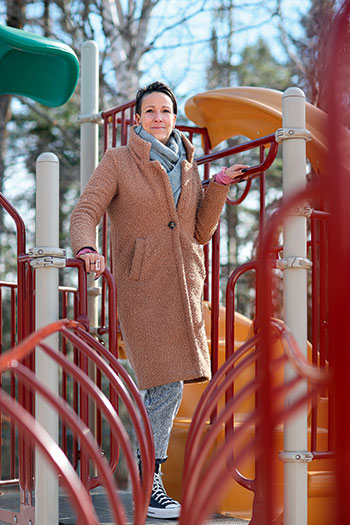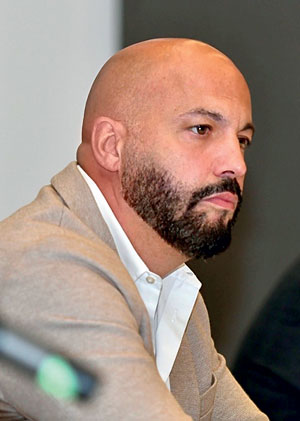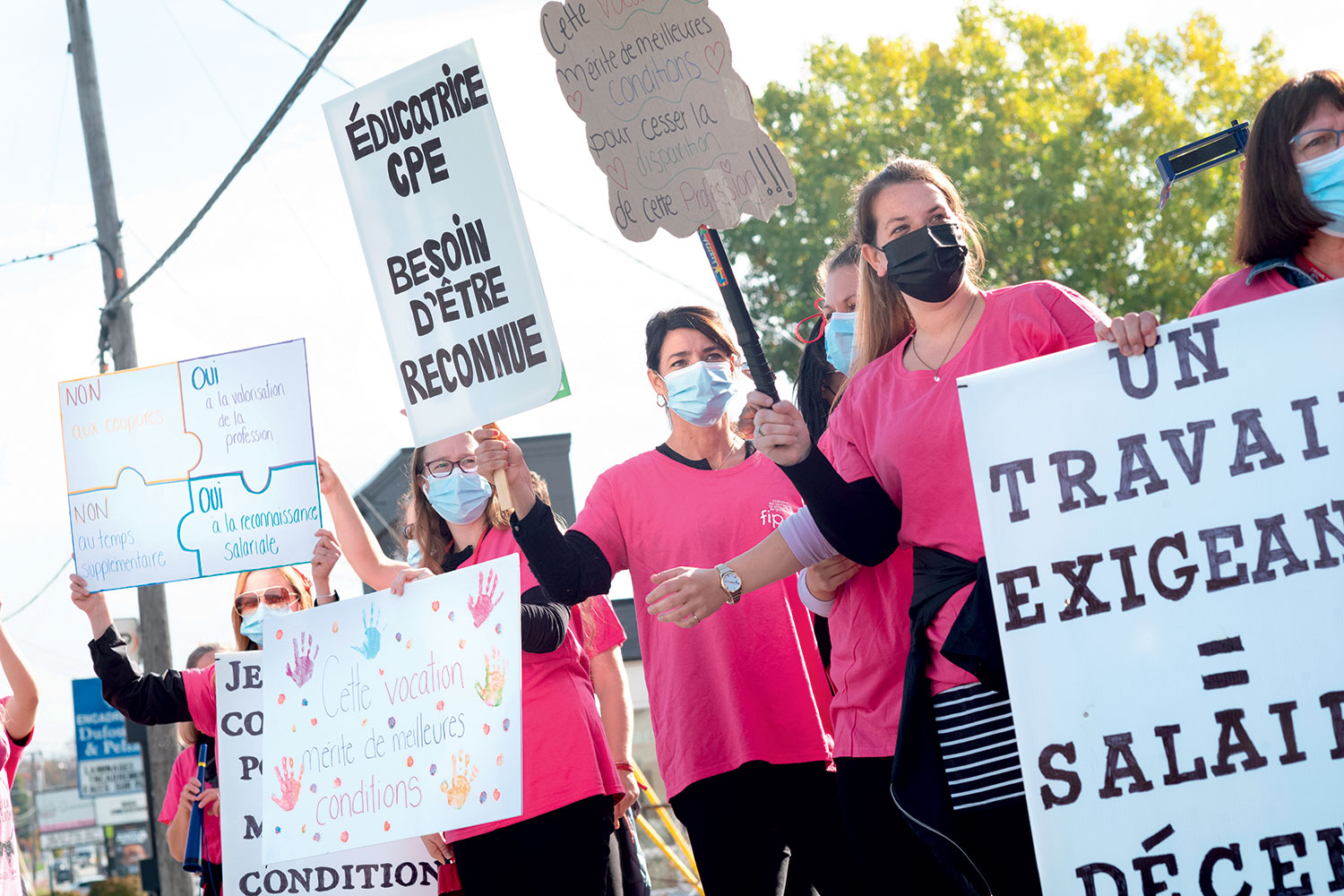Children living in disadvantaged socioeconomic areas, children of newly arrived Quebecers and children with special needs most often attend private daycare centres, particularly in Montréal. Children who attend these daycares are more likely to have significant developmental delays or behavioural issues that will persist when they get to school. These little ones lag behind other children when they move on from daycare, says Éva (name changed).
Seated in a café in downtown Montréal where we arranged to meet, Éva asks me to withhold her real name and her job title, so that relating her experience would not harm her professional reputation or place her employer in a difficult situation. However, she describes her work to me, which requires her to make regular visits to all types of childcare facilities, including childcare centres (CPEs), home childcare settings, and both subsidized and unsubsidized private daycare centres.
In private childcare settings, what she has observed all too often breaks her heart. “On site, I remain professional, but when I get into my car, sometimes I burst into tears. I have to stop myself from going back and gathering children in my arms and giving them a huge hug,” she says. “I feel badly for the parents who entrust their children, the most precious things in their lives, to others, and who have no idea of what their children experience every day.”
Children stifled
Éva tells me about “the shushers,” as she calls them, whom she encounters far too often in private settings. “Shushers” are educators, qualified and unqualified alike, who don’t allow children to express themselves and whose best answer when children ask questions is “shush.”
The children are not entitled to ask for anything, to say that they are missing their parent or that they would prefer to go play outside instead of doing crafts as assigned. They are told to “shush” and to keep quiet. “This makes me so angry!” she exclaims. “Why do they work with children if they don’t want to support them with their development?”
Éva has met educators who prefer not to show children affection, to prevent them from becoming too attached or too clingy. “They think they have to let children cry themselves to sleep. Had they been trained, these women would know that children need emotional security in order to thrive. They should reread their educational program or just go ahead and change professions,” the young woman adds.
She described how the premises are often too small for the number of children occupying them. The noise is unbearable to the point of causing headaches… or feeling like smashing everything in sight. “Imagine how the children feel!”
Poorly adapted childcare centres

There is a shortage of toys in private settings. Éva remembers a place where there were four small toy boxes for about twenty children. First come first served. The latecomers had no toys to play with, to explore or to choose from.
“The children were forced to remain seated for hours, singing and doing crafts; the staff would take children by the hand to force them to trace letters and numbers. I even saw an educator humiliate a child by forcing him to sing solo in front of his group just because he didn’t feel like singing along with the others,” says Éva.
She added that daycare facilities take great pride in telling parents that their child knows how to sing in several languages thanks to the music, English or Spanish lessons that the establishment offers. “I even visited a place where the children were able to recite La Fontaine’ Fables… at 4 years old!”
Perfect facilities, no. Better than others, yes.
Éva acknowledges that there are good private daycare centres and that you shouldn’t put them all in the same basket. However, she says that the situations she has described to me are not isolated cases. “I have seen many private daycare facilities like those, in Montréal. They represent the majority.”
The settings that radiate warmth, where children are free to play, explore, choose and thrive, and where trained, motivated and passionate educators observe the children and provide them with stimulation, are mainly found in CPEs, according to the young woman.
More subsidized spaces
The educational childcare network currently has 283,000 spaces. The Québec government recently announced, as part of its Grand chantier pour les familles action plan designed to meet the needs of families, that it was adding 37,000 more subsidized spaces by 2025.
To deliver on this project and to improve access to the educational childcare network, in October, the Minister of Families, Mathieu Lacombe, tabled Bill 1, An Act to amend the Educational Childcare Act. The legislation makes profound changes to the rules affecting childcare services, in particular by allowing CPEs and private daycares to offer up to 100 spaces (instead of a maximum of 80) and up to 500 spaces in cases where an establishment operates several facilities. The number of spaces per CPE or private daycare centre will no longer be limited.
Urgent action needed
The creation of thousands more subsidized spaces announced by the government will require the hiring of 17,800 additional educators, including 14,000 qualified educators. Yet the childcare network is already facing a labour shortage.
The President of the Fédération des intervenantes en petite enfance du Québec (FIPEQ-CSQ), Valérie Grenon, has stated that in order to attract new educators, it is urgent to improve the working conditions of CPE employees who are currently in negotiations to renew their collective agreement. “The educators are tired, they are at the end of their rope, and their work continues to be under-valued,” says Éva, indignant.
“Creating 37000 spaces is a good thing, but by not dealing with the issues related to educational childcare personnel, the government is running the risk of creating empty shells. As long as educational childcare training continues to be one of the college technical programs offering the lowest of incomes, collectively, we will be falling behind,” Valérie Grenon says.
Equal opportunity for all children

When she thinks about the private daycares that she regularly visits, Éva deplores the fact that facilities providing poor service are seldom reprimanded, if at all. Educational childcare facilities that should have been closed down long ago are still operating years later, even when complaints are formulated about them.
The young woman does not understand how the government can allow inequalities to continue to widen between children who attend different kinds of establishments: “How is it that the government allows this to continue today? Why do we as a society accept it? Action needs to be taken now. All families should have access to a place of quality and trust for their children.”
According to a recent study conducted by the Ministère de la Famille, 94.3% of those surveyed believe it is important to provide all parents in Québec with a subsidized childcare space based on a universal fee. This finding directly supports the CSQ demand for securing a universal, and accessible public early childhood network.
“A public network of affordable educational childcare is an essential public service. Every child should benefit from sound learning provided by passionate, trained and highly qualified educators,” says CSQpPresident Éric Gingras.
He concludes by adding that “investing in an educational childcare network and making it accessible to all Québec families means taking responsibility as a society!”

